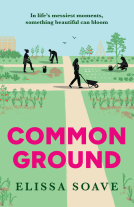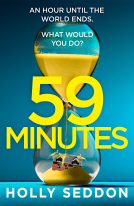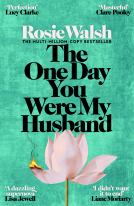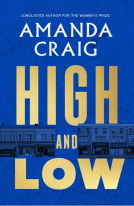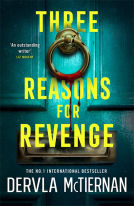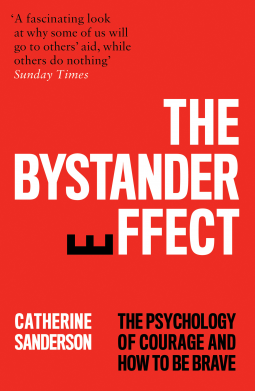
The Bystander Effect
The Psychology of Courage and How to be Brave
by Catherine Sanderson
This title was previously available on NetGalley and is now archived.
Send NetGalley books directly to your Kindle or Kindle app
1
To read on a Kindle or Kindle app, please add kindle@netgalley.com as an approved email address to receive files in your Amazon account. Click here for step-by-step instructions.
2
Also find your Kindle email address within your Amazon account, and enter it here.
Pub Date 7 Apr 2020 | Archive Date 31 Oct 2020
HarperCollins UK | William Collins
Description
In the face of discrimination, bad behaviour, evil and abuse, why do good people so often do nothing?
Every day, we see examples of bad or immoral behaviour – from sexual harassment to political corruption, from negligence to bullying.
Why did no one stop the abduction of Jamie Bulger, despite many witnesses reporting they felt uneasy seeing the two-year-old’s distress? How did the USA gymnastics team doctor, Larry Nassar, abuse hundreds of young women under his care for so long? Why didn’t anyone intervene when David Dao, an innocent sixty-nine-year-old man, was forcibly removed from his seat on a United Airlines aeroplane and dragged down the aisle by security officers? How did large crowds of men get away with sexually assaulting an estimated 1200 women in Cologne during the 2015 New Year's Eve celebrations?
In The Bystander Effect , pioneering psychologist Catherine Sanderson uses real-life examples, neuroscience and the latest psychological studies to explain why we might be good at recognising bad behaviour but bad at taking action against it. With practical strategies to transform your thinking, she shows how we can all learn to speak out, intervene, think outside the group mentality and ultimately become braver versions of ourselves.
Courage is not a virtue we’re born with.
A bystander can learn to be brave.
Advance Praise
'Much of what enables evil people to do evil things is that we stand idly by and let them. In this powerful, well-written book, Catherine Sanderson explains what psychology has taught us about why good people so often do nothing and offers wise suggestions that will enable more of us to step up and be "moral rebels" when the situation calls for it. If you have ever regretted being silent (and who hasn't?) this is the book for you' Barry Schwartz, author of The Paradox of Choice
'Catherine Sanderson, like no other psychologist, invades our minds. Her riveting storytelling challenges us to rethink why we avert our eyes to evil, tolerate bullying, and excuse unforgivable workplace behavior. She plumbs the depths of social norms that too often prevent good people from being good and points to steps all of us can take to become “moral rebels’’ whose voices can change society for the better'
Walter V. Robinson, former editor of the Boston Globe’s Spotlight team
Available Editions
| EDITION | Ebook |
| ISBN | 9780008361648 |
| PRICE | £5.99 (GBP) |
| PAGES | 240 |
Average rating from 49 members
Featured Reviews
 Kellie C, Reviewer
Kellie C, Reviewer
A brilliant introduction to anyone who is new to psychology and new to some of the experiments and psychologist named in this book. My favourite being Milgram’s studies of Obedience. I think this book is an excellent up to date look at the bystanders effect and how social media can play a massive role.
 Douglas O, Reviewer
Douglas O, Reviewer
I approached this book with caution,concerned that it's academic content might be offputting. I was wrong. It certainly has the credentials of a carefully researched and recorded account but it is interspersed with relevant real life examples which make it an important read. These examples enable the reader to test the research against real life incidents. The role of the Bystander is the easy option,never intervening when faced with victims of assault,abuse or worse. This book records the research that shows the characteristics and backgrounds of those most likely to have the courage to intervene. The use of examples of incidents and research from outside the United
States as well give it an added relevance. This is an important book in encouraging people to stand up for themselves,for friends but strangers too when they see or hear of unacceptable behaviour.
Having recently read Chanel Miller’s Know My Name and been shocked, angered and disgusted by Brock Turner, the man convicted of assaulting her, reading this helped me to understand the motivation, actions and emotional response of the two Swedish students who stopped the attacker and helped her.
This reads as a well researched piece of academic writing within the non-fiction genre; it is both interesting and informative and its written in a way that is accessible and feels very current. The author makes multiple references to well known events in both the US and the UK and she draws on recent academic studies from many Western universities.
By making reference to so many examples within common culture (the Brock Turner/Stanford Rape incident, the murder of Jamie Bulger, the conviction of Larry Nassar, the USA gymnastics coach etc) this book feels very relevant and necessary, not only to help us understand the wrongs already done, but in helping us to understand what we can do as moral rebels; to intervene and stop harm from happening in these ways again, rather than being a passive bystander who witnesses, but does nothing. It offers an explanation to why witnesses witnessed, but did not intervene and provides the reader with opportunities to reflect on the difference between good intentions and effective intervention.
I found the book empowering, inspiring and encouraging. I’d like to thank the author, publisher and NetGalley for the opportunity to review The Bystander Effect in exchange for an honest review.
⭐️⭐️⭐️⭐️
 Verity W, Reviewer
Verity W, Reviewer
This is an interesting and well-researched look at why some people intervene in situations and some do not. It’s not always that easy to follow though - sometimes I got a bit lost in the science. I was expecting it to be a bit bleaker than it turned out to be - the author has (smartly in my opinion) subtly focused it on how you can stop people from being bystanders and get them to intervene. I came away with some ideas for tactics for real life. I’ll probably mention it to my sister - who is a primary school teacher - as something to take a look at for strategies with her pupils.
 Rony C, Reviewer
Rony C, Reviewer
Understanding the psychology of courage and inaction
This book offers brilliant direction to transform silence and bad behaviour.
Teachers, Human Resources managers and leaders in communities; this book is essential to add to your resources.
Catherine Sanderson has wisely chosen to write this book, “providing insight into the forces that keep us from acting - offering practical strategies for resisting such pressure in our lives.” Scholarly research and insights from neuroscience and psychological studies validate Catherine’s use of her research and experience.
For one example in her book, Sanderson advises that social norms within a school can be changed by training a group of “social influencers” leading to research outcomes being very positive. Another worthwhile piece of advice, which is often neglected, is to build strong, caring and warm relationships at schools, work and home.
In the beginning, Sanderson succinctly describes what she is going to cover in each chapter, so you are forewarned about: Staying silent in the face of bad behaviour, bullying at school, sexual misconduct, and unethical behaviour to name a few. She examines how some people can stand up to others and then finally provides direction for strategies we can all use to speak up and take action when it is needed.
This book requires focused and concentrated reading, which is not when you feel like curling up with a book.
BonnieK
Elite Reviewing Group received a copy of the book to review.
The Bystander Effect: The Psychology of Courage and Inaction by Catherine Sanderson is interesting and brilliant looking into the to psychology behind the bystander effect.
The book is excellently up to date on the effects the bystanders and how social media can play a massive role in people's behaviour.
It also looks at some of new and old experiments carried out in the field of psychology my personal favourite being Milgram’s studies of obedience.
Overall the book is well written and a excellently up to date look at the bystanders effect , I recommended this book to anyone with a interest in human behaviour and to anyone with general interest in psychology.
 Reviewer 589132
Reviewer 589132
I have been fascinated by the bystander effect for a long time so I was incredibly excited to be able to have a chance to read The Bystander Effect.
Prospective readers should be aware that the nature of this book means that there is discussion of difficult topics like rape and sexual assault but there is also a heavy message of hope throughout as examples of people going against the bystander effect are given. Additionally, the final couple of chapters are devoted to exploring methods for combating the inaction caused by the bystander effect.
There is a really great grounding in science throughout as Sanderson draws of numerous studies.
I thoroughly enjoyed this book and highly recommend it!





